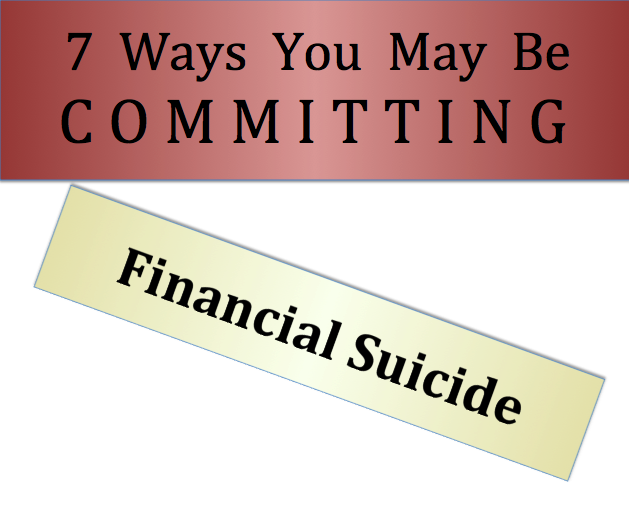The difference between real suicide and financial suicide is that in real suicide a person voluntarily and intentionally take their own life while in financial suicide a person voluntarily but unintentionally deplete their funds. And so it is very easy for someone to get into situation(s) that allow financial suicide to take place. Financial suicide happens as a result of something that was previously done. It is the effect of a cause. Here are 7 Ways You May Be Committing Financial Suicide.
1. Marrying the Wrong Person
One of the biggest decisions any individual can make, is choosing to get married. Choosing whom to marry is an epic decision with major implications, and there are many aspects to consider, discuss, and come clean about before making that big decision to marry. Unfortunately, the financial aspect of the relationship rarely gets discussed prior to many couples getting married, which has proven to lessen the survive-ability of those marriages. Remember: Marriage is also a financial contract! As such, it’s always a financially dangerous proposition, and should not be conducted without the proper pre-marital investigation of both parties with full disclosure, and a viable financial plan discussed and put in place. Also, there are countless “responsible” people who ended up bankrupt due to the actions of a financially undisciplined spouse. You can go into a marriage with the most assets, funds, and the most at stake, and you could lose it all – if you do not protect yourself from the beginning. If you are getting ready to be a bride, take note! Don’t take the plunge until the financial situations are disclosed, discussed, and decided with a plan. The average cost of a divorce is approximately $20,000, and that does not include any assets you stand to lose in your divorce. Be smart, savvy, and strategic in your premarital decisions and avoid financial suicide.
2. Living Above Your Means
Trying to keep up with the Joneses is a sure way to commit financial suicide. Yeah, we all like nice things! And what “nice things” are for me, may not be nice things for you; however, the criteria of what’s desirable is usually decided for most of us by our peers – famous, popular people in our age range. This desire often lead an individual to strain their finances to live in the same neighborhood as the Joneses, drive the same car as the Joneses, wear the same designer clothes as the Joneses, join the same clubs as the Joneses, eat at the same restaurant as the Joneses, take as many vacation to the same destinations as the Joneses, send our children to the same schools as the Joneses, and the list goes on and on. This type of living – if not carefully planned for, will wipe out every dollar, dime, and penny into financial suicide instead of financial prosperity.
3. Failing to Accurately Track Income and Expenses
Trying to get a handle on your personal finances without knowing how much money you are earning, and where it is all going, is tantamount to trying to drive while blindfolded. People who fail to take the time to analyze their finances typically end up crashing and burning because they lack a means of ensuring they get the most from their income. As with anything else, if you are taking out more than you are putting in, it will definitely be a matter of time before it is all depleted. So, whether or not you are keeping up with the Joneses, make sure you are accurately tracking and managing your finances. To do otherwise will have you committing financial suicide.
4. Failing to Establish a Plan for the Future
The young always seem to have more time than money, which is why financially important things like putting aside money for short and longer-term emergencies or feathering a retirement nest egg, are often never even considered until people approach their golden years. Of course, by then, it’s usually much too late. The old cliche really is true: Failing to plan is the same thing as planning to fail. The best time to start planning is always when you are younger; however, regardless of where you are in age right now, you need to start planning for those days when you are no longer able to work but still must survive and thrive. If you do not have ample amount of savings, you will run out of funds and end up committing financial suicide.
5. Abusing Your Credit Cards
Credit Cards are powerful! And can help you get ahead in many ways. However, without the proper financial knowledge, acumen, and discipline, credit cards can be detrimental to your financial health which could also lead to other personal ruin. If you haven’t yet gotten a credit card, learn how to use credit cards responsibly before doing so. It is also important that you not get a credit card if you do not have a secure job, or have a substantial amount of savings to use to pay the minimum balance in the event you lose your job. Using credit cards without proper planning can catapult your debt, ruin your credit, and result in you committing financial suicide.
6. Having Unplanned Children
Like any other huge decision, a plan should be in place for having a child including a time to start the conception process after the proper necessities are put in place, to ensure them the resources they will need. There is nothing more destructive to one’s financial future than bringing children into the world without having an established and stable means to support them. Raising children requires a tremendous investment of not only money, but time and commitment as well. Unfortunately, when those resources are in short supply, it becomes extremely difficult to maintain a stable home environment, meet basic needs, and accumulate wealth for their future and yours. This is not only unfair to you; it is unfair to your children as they did not ask to be here, and now without the proper provision they will be guaranteed to go with you into the financial suicide you are committing.
7. Maintaining Financial Dependency on Others
This is a disaster temporarily averted! It is a known fact that people who are being taken care of by others – financially and otherwise, will take full advantage of that situation and not try to help themselves. This is detrimental to the dependent, and I’m talking about grown, able-bodied adults – not children. This behavior has developed in them a dependency attitude that will cripple them in the long-term and leave them financially disabled. People who are taken care of by others are not usually working at enhancing themselves to come out of their dependency, but are instead becoming fixated and permanently financially disabled. For this same reason I’m absolutely convinced that the longer people remain dependent on government assistance or friends and family for financial support, the tougher it will become for them to achieve financial independence. What will happen when those sources are no longer available? They have already committed financial suicide and may now find themselves committing real suicide. Don’t leave your most important asset – yourself, to others! Get your priorities in order and move towards financial independence.
So there you have it! 7 Ways You May Be Committing Financial Suicide.
Unlike real suicide, financial suicide is not a death sentence! And it does not happen immediately! If you are committing any of the 7 financial suicide listed above, you have a chance to stop and turn it around in your favor. Remember, the first step is acknowledging, then and only then can you move forward in doing something about it. Make the change!
Xo,
![]()



Ooooh, I love that term financial suicide! I know that’s right. Marriage is indeed a financial contract as well. It’s kinda tough to know if the person is right or not when those love bugs are churning, but I guess that’s one chance we’ll have to take – of course after setting up proper protocols to protect our assets.
Indeed Katherine! Setting up protocols is always the way to go.
Very strong argument Eugénie!
Having unplanned children is the most common thing today, and so many are without dads. I feel so sorry for those children, especially since they did not ask to be here. Wonder what can be done about it?
Janice, I’m not sure what can be done about it, except individuals taking responsibility and not allow it to happen. That is, in places where they are free to do so. In many countries women are being raped, and sometimes blamed for being rape…crazy, I know! But in free countries, it is mostly a choice, and it can stop with each individual.